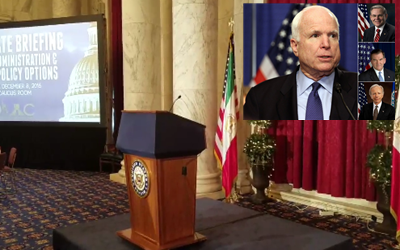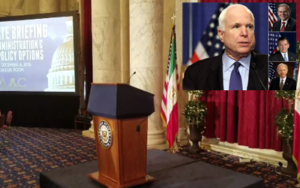
 A meeting of senior law-makers from both Republican and Democratic parties met at the Senate on Thursday to discuss the prospects for change in Iran. The Washington Times reported that the event “marked another step in the remarkable evolution of its organizer, the Paris-based National Council of Resistance of Iran and the NCRI’s largest component, the Mujahedeen-e Khalq (People’s Mujahedeen of Iran), or MEK.”
A meeting of senior law-makers from both Republican and Democratic parties met at the Senate on Thursday to discuss the prospects for change in Iran. The Washington Times reported that the event “marked another step in the remarkable evolution of its organizer, the Paris-based National Council of Resistance of Iran and the NCRI’s largest component, the Mujahedeen-e Khalq (People’s Mujahedeen of Iran), or MEK.”
Describing the MEK as a “fierce opponent of the Islamic republic regime in Tehran and a source of many of the intelligence scoops detailing Tehran’s clandestine nuclear programs,” The Washington Times said it “was placed on the State Department’s list of terrorist organizations in the mid-1990s but, backed by a growing number of supporters on Capitol Hill, was removed from the list in 2012.” The MEK “remain committed to the peaceful overthrow of the theocratic regime in Tehran in favor of a new secular, democratic government.”
Reflecting on the prospects for change, senior Congressional leaders argued that two factors have heightened the probability of positive change: the election of Donald Trump and the team he is assembling to take office; and the resolution of the issue of the MEK’s Camp Liberty in Iraq. The latter – the release of more than 3,000 MEK members from harassment and attack from the Iranian regime – means, said former Senator Joseph Leiberman, that the NCRI “can focus on resistance and changing the regime” in Iran.
As for Donald Trump, Tom Ridge, the first Secretary of Homeland Security, said “There is every reason to believe and be hopeful that the President-elect will take a new set of eyes and a new approach to this theocracy.”
Senate Armed Services Committee Chairman, John McCain, said of Mr. Trump’s choice of James N. Mattis to head the Defense Department, was a good one given that the retired Marine general has criticized the Iran nuclear deal as “imperfect” and had declared that “the Iranian regime, in my mind, is the single most enduring threat to stability and peace in the Middle East.”
Former Senator Joseph Lieberman, the 2000 Democratic candidate for Vice President, said, “I really think a new day is dawning for the cause of a free, stable, independent and democratic Iran…Now we go to an administration that is not protective or defensive of the Iran agreement, but is ready to challenge it.”
Iran has, The Washington Times reported, “stepped up its warnings” to a President-elect who is deeply critical of the West’s nuclear deal. President Hassan Rouhani said, just this week, that Mr. Trump “may wish many things, he may wish to weaken or tear up [the nuclear deal], but will we and our nation allow such a thing? America cannot influence our path of strength and endurance.”
However, those at the Senate event, which included Democratic Sen. Robert Menendez, a veteran of the Senate Committee on Foreign Relations, reiterated that Iran “has already violated both the letter and the spirit of the deal, with little sign that Tehran has modified its policies or stopped sowing instability in regional hot spots from Syria to Yemen,” said The Washington Times.
Mr. Lieberman said Mr. Trump and the Republican-dominated Congress could take a number of steps to stop Iran’s aggression, including new unilateral sanctions and designating Iran’s Revolutionary Guard Corps, which exports the revolution for the country’s theocracy, as a terrorist organization. “The sanctions could hurt,” The Washington Times said, “because the IRGC has built up a major business empire in addition to its military operations.”

